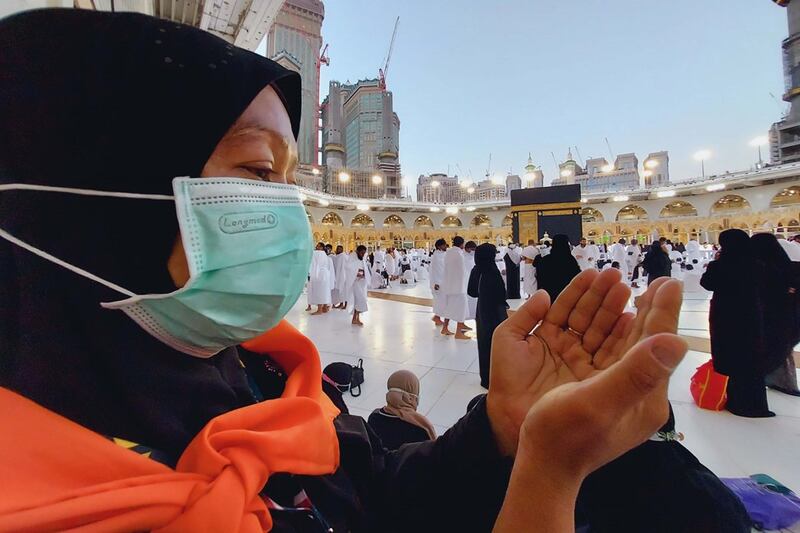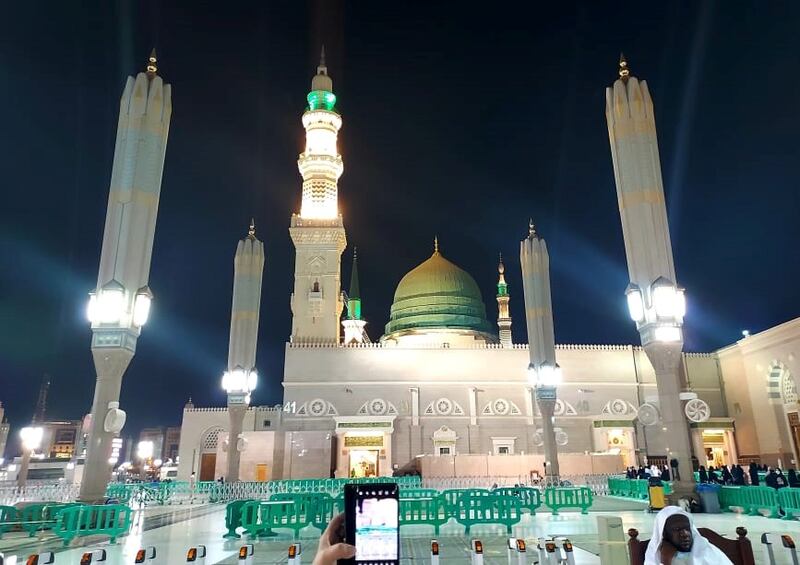Yumida Yusof, a widow from Thailand’s violence-torn Deep South, was thrilled that her “impossible wish” for Umrah – a once-in-a-lifetime pilgrimage to Islamic holy sites in Saudi Arabia – was coming true.
She was terrified, too, because she had never been on an airplane.
“I could not even decide which foot to put first when walking from the passenger lounge to board the plane,” said the 55-year-old dessert vendor from Yala province.
But after the plane touched down, “I simply went teary with joy when I was walking out of Medina Airport” to be in the land of the Prophet Muhammad.
Yumida was among 112 people making the pilgrimage from late November to mid-December. Many were relatives of people killed in violence tied to a separatist insurgency in Thailand’s mostly Muslim southern border region.
The Thai government covered the cost of the 14-day trip to Medina and Mecca, saying this was part of a program to compensate people who have lost loved ones during the conflict in the Deep South. The government also sponsored a BenarNews reporter who took part in and documented the pilgrimage.
“I was overjoyed when I found out that I was chosen for the Umrah pilgrimage, despite the COVID-19 rampage,” Yumida said, as she prayed next to Islam’s most sacred site, the Kaaba, at the Great Mosque in Mecca, also known as Masjid al-Haram.
In 2011, unidentified gunmen shot dead Yumida’s husband as he was returning home from a fruit plantation in Bannang Sata, a district of Yala.
“I think one must be extraordinarily fortunate for Allah to allow him or her to be the guest to his house, and to fulfill my impossible wish.”
The Southern Border Provinces Administration Center (SBPAC), a government agency, spent 14 million baht (U.S. $417,533) for the Umrah, which, unlike the Hajj, can be taken at any time of the year. The pilgrims spent five days in Medina, eight in Mecca, and a few more on Phuket, an island in Thailand popular with tourists, before they headed home.
Referring to people widowed or orphaned by the war and related violence in the Deep South, Thai officials said the objective of sponsoring the trip was to “compensate the survivors and connect with them to do something good.” They did not elaborate on what the government expected in return.
“They are good people, have high morals. All of them were dedicated to worshiping at the Umrah and absolving their sins. May all the followers help propel such great activity, to support people to do good,” said Praves Meedsen, an SBPAC employee who went on the trip.

Praying for peace
More than 7,000 people have been killed in the southern border region since the Barisan Revolusi Nasional (BRN) and other armed separatist groups renewed their decades-old insurgency against Buddhist-majority Thailand in 2004.
Locals say both sides in the conflict – the Thai government forces and the rebels – are to blame.
Meanwhile, human rights groups have accused the Thai military of using excessive force on suspected insurgents, as well as torture. For their part, Deep South residents often bury slain fighters as martyrs for Patani, as the region is known among its Malay-speaking majority.
This year’s Umrah pilgrimage is the seventh that SPBAC has sponsored, officials told BenarNews, adding that the arrangement is approved on a year-by-year basis.
The trip was carried out amid stringent pandemic measures, including for the pilgrims to obtain a special Umrah passport, undertake a pre-trip quarantine, repeated COVID-19 tests, and other health protocols.
But the pilgrimage had its upside, too, according to another participant. Fewer visitors during the pandemic meant that the Thai attendees could better concentrate on worship and get closer to Mecca’s Great Mosque and Medina’s Al-Masjid an-Nabawi, or the Prophet’s Mosque.
“There were places such as the living quarters of the Prophet Muhammad. Many are not able to visit it, but we were,” said Maeya Koneng, a pilgrim and widow from Pattani province, referring to Rawdah, a section in Al-Masjid an-Nabawi.
“It is not that easy during Umrah for a typical tour group to get close to Rawdah. Many never had such a chance,” Maeya said. “I am so happy and honored by Allah.”
It was her first trip out of Thailand for the 45-year-old noodle vendor, whose husband was shot dead in Koke Po, a district of Pattani, more than 16 years ago.
“We performed the Dua prayer to Allah to protect everyone from the pandemic and for the violence to disappear from the Deep South,” Maeya said of her worship during the pilgrimage.

‘I don’t forget the tragedy’
The Umrah miracle came at a heavy price for Yumida, a mother of five, and Maeya, a mother of one.
“It is my top-wish compensation that I have longed for years. I thank Allah and the Southern Border Province Administration Center for sponsoring this chance for Umrah, but I don’t forget the tragedy. It is still with me every day,” Yumida said of the unexplained and untimely death of her husband.
An NGO working in the Deep South said the government could do much more to connect with regular people and win hearts and minds across the border region.
“The remedy program is good, but I’m not sure the authorities could gain civilian support out of it,” said Anchana Heemmina of the Duay Jai Group. The organization has alleged that the Thai military uses torture on Deep South detainees.
“The relationship must be sincere, full of respect for the people, instructional on peace, and make room for them, let them have a role in the peacebuilding process.”
Thai government negotiators and representatives of the BRN are reportedly poised to meet in person in January in Kuala Lumpur, after face-to-face meetings were suspended for nearly two years because of the COVID-19 pandemic.
